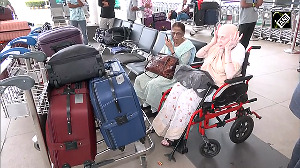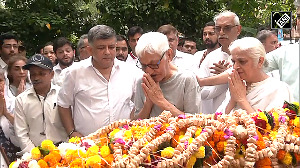In the run-up to United States President Barack Obama's India visit, former US deputy secretary of state Richard L Armitage and former under secretary of state for political affairs R Nicholas Burns authored a document, which hopes to be the blueprint for future US-India relations. In it they recommend that the US give concrete meaning to the phrase "strategic partnership" by deepening relations and strengthening collaboration in a number of areas with India. An excerpt:
It becomes critical to rejuvenate the partnership between the United States of America and India and put US relations with India on a more solid foundation as US President Barack Obama's visit to India draws near. The US should establish a vision for what it seeks in the relationship and give concrete meaning to the phrase "strategic partnership" and commit, publicly and explicitly, to work with India in support of its permanent membership in an enlarged UN Security Council; seek a broad expansion of bilateral trade and investment, beginning with a bilateral investment treaty, greatly expand the security relationship and boost defense trade among others.
The US and India are strategic partners with a shared interest in security throughout Asia. In fact, the US now holds more military exercises with India than with any other country. Counterterrorism cooperation accelerated rapidly after the deadly 2008 Mumbai attacks and was formalised in a memorandum of understanding between the two governments in July 2010.
The two nations should continue to enhance this cooperation by sharing information about key threats, coordinating their approaches to terrorist threats throughout the South Asia region and undertaking other joint actions to protect the democracies. The US should also modify its export-control measures, permitting increased exports of defense-related technology and goods to India.
While US-India discussions about China have expanded significantly, discussions of Pakistan and Afghanistan remain inadequate. India should also engage in a robust dialogue about Pakistan and cooperate more effectively in the global effort to end Iran's pursuit of nuclear weapons.
A stronger economic relationship
The economic relationship between the United States and India has grown significantly, but prioritising a multilateral trading system by adopting bilateral trade and investment measures are necessary. The long-delayed bilateral investment treaty should be signed and the US should also liberalise its H1B visa regime so that Indian talent can contribute to the American economy. The Indian government should also increase access to the Indian market by lowering tariffs, eliminating offset requirements, increaseng investment caps and facilitating business visas.
The US should also coordinate with India before each G-20 session and work with it to encourage the free and properly regulated flow of financial capital across borders. At the same time, India's voting shares at the World Bank and the International Monetary Fund are increasing, permitting those institutions to better reflect the contemporary global power balance.
Prime Minister, Manmohan Singh has spoken of the importance of spurring a second Green Revolution in the subcontinent, and a collaboration in this area should represent a major new bilateral initiative. Comprehensive reform of Indian agriculture will require research into methods for increasing yields and, in pursuit of this goal, the US should explore ways in which American landgrant universities can increase their involvement and seek ways of increasing cooperation in higher education -- establishment of satellite campuses and other higher education collaborations in India as the country liberalises its laws to permit foreign investment in Indian higher education.
India's emergence as a key actor at the Copenhagen summit on climate change in December 2009 represented a turning point in its global activism. The Copenhagen talks put new stresses on the bilateral relationship when India sided with the BASIC (ie, Brazil, South Africa, India, and China) bloc rather than with the United States and its other partners.
While real differences exist -- and will likely continue -- on the best methods for reducing carbon emissions, this effort should not be seen as a competition between developed and developing countries. Any meaningful reduction in carbon emissions will require the active collaboration of the world's largest energy consumers.
Nonproliferation and export controls
While the two sides agreed on the historic Civil Nuclear Agreement in July 2007, nuclear trade has not commenced. India views the US export control regime as anachronistic and sees denials of licenses to access sensitive technology as conflicting with the intent of the new bilateral relationship.
In that, the civil nuclear agreement constituted a historic step forward and both the countries must press vigorously for rapid implementation of the agreement. The Indian Parliament recently passed a nuclear-liability law that deviates significantly from international standards and renders equipment suppliers potentially liable for as long as 80 years.
This law is a major disappointment to private and public officials in the United States, and India should take quick and resolute action to resolve this issue. Doing so would facilitate defense cooperation and military-to-military ties, expand bilateral trade in the high-technology, enable the two countries to focus on other bilateral priorities, including reducing other market barriers that restrict bilateral trade.
The Obama administration's current review of US export controls presents a unique opportunity to grant India preferred access to both dual-use and munitions items. The United States should remove Indian Space Research Organisation subsidiaries from the US Entity List and consider removing other organisations from the list as the Indian government draws clearer lines between its civil space and civil nuclear activities on the one hand, and its ballistic missile and nuclear weapons activities on the other.
Building on past nuclear and nonproliferation achievements, the US should further integrate India into the mainstream of global nonproliferation institutions. This should include unambiguous American support for India's membership in multilateral export-control regimes.
The US should also cease calling for India to join the Nuclear Non-Proliferation Treaty as a non-nuclear State, as it has for many years; rather, should encourage India to fully conform its laws, policies and practices to those of NPT members, irrespective of its non-member status. For its part, India should work closely with the United States and the rest of the international community to prevent Iran's development of nuclear weapons.
United Nations Security Council
The UN Security Council fails to reflect the distribution of power in today's world, and does not take into account India's rise to global power status. The US should commit, publicly and explicitly, to work with India in support of its permanent membership in an enlarged UN Security Council. The two countries should view cooperation at the UN -- including cooperation on key votes -- as comparable to cooperation between the United States and its major allies.
New Delhi has long leaned toward noninterference, and India and US votes in the UN General Assembly last year matched just 30 percent of the time. With US support for Indian permanent membership on the UN Security Council, the character of bilateral cooperation at the UN will need to change. This will not be a painless process; bilateral cooperation historically has been easier than US-India collaboration in multilateral organisations.
Taking democracy forward
Twelve years ago, then Prime Minister Atal Bihari Vajpayee declared that the United States and India, the world's biggest democracies, were "natural allies." The two countries should work together to spread the culture of democracy in lands where it does not yet exist though there are genuine differences on their approaches to the expansion of democracy and human rights and on the countries best suited for such support.
These differences manifest themselves in policy disagreements about several of the countries in India's neighbourhood such as Pakistan and Burma. Supporting democracy and human rights should involve the people of both countries.
Long a recipient of foreign assistance, India has emerged as a donor in its own right. The two countries should choose one major development project and coordinate their aid, linking it to a domestic reform plan in the target nation. Such an effort could include a code of conduct that establishes basic norms of governmental and corporate behavior impacting privacy, freedom of online speech and assembly and protections for national security.
Articulate an ambitious agenda
More than six decades have passed since Prime Minister Jawaharlal Nehru addressed a joint session of the United States Congress. Nehru said, "What is required is a true understanding and appreciation of each other even where we differ. Out of that understanding grows fruitful cooperation in the pursuit of common ideals."
Only 15 years ago, collaboration in many of the areas described above would have been unthinkable. But this progress is not self-sustaining. It requires bold leadership to expand and deepen the US-India partnership in a spirit commensurate with its vital importance. Progress also requires vision.
In this young century, the United States and India must articulate an ambitious agenda of cooperation that will serve both countries for decades to come. Acting as strategic partners, our two countries can better promote peace and stability in Asia, increase the prosperity and economic opportunity of our populations, tackle key transnational issues like terrorism and climate change, embark on a close and enduring defense relationship and spread the culture of democracy on which our two nations are built.









